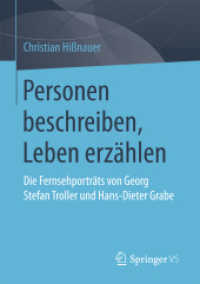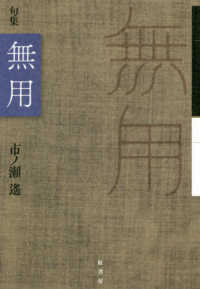- ホーム
- > 洋書
- > 英文書
- > History / World
Full Description
Thinking through Transition is the first concentrated effort to explore the most recent chapter of East Central European past from the perspective of intellectual history. Post-communism can be understood as a period of scarcity and preponderance of ideas, the dramatic eclipsing of the dissident legacy (as well as the older political traditions), and the rise of technocratic and post-political governance. This book, grounded in empirical research sensitive to local contexts, proposes instead a history of adaptations, entanglements, and unintended consequences. In order to enable and invite comparison, the volume is structured around major domains of political thought, some of them generic (liberalism, conservatism, the Left), others (populism and politics of history) deemed typical for post-socialism. However, as shown by the authors, the generic often turns out to be heavily dependent on its immediate setting, and the typical resonates with processes that are anything but vernacular.
Contents
Introduction Michal Kopecek (ICH, Prague), Piotr Wcislik (CEU, Budapest): Towards Intellectual History of Post-Socialism Liberalism: Dissident Illusions and Disillusions Ferenc Laczó (Imre Kertész Kolleg, Jena): Five Faces of Post-Dissident Hungarian Liberalism: A Study in Agendas, Concepts and Ambiguities Piotr Wcislik (CEU, Budapest): Totalitarianism and The Limits of the Political Thought of Polish Dissidents: Late Socialism and After. Milan Znoj (Charles University, Prague): Václav Havel, His Idea of Civil Society and the Czech Liberal Tradition Paul Blokker (University of Trento): The (Re-)Emergence of Constitutionalism in East-Central Europe Conservatism: A Counter-Revolution? Petr Roubal (ICH, Prague): The Conservative Counter-Revolution: Post-Dissident Neoconservatives in Post-communist Transformation. Rafal Matyja (WSB-NLU, Nowy Sacz): Polish Conservatism after Communism: Tradition of Sovereignty and Sovereignty of Tradition Zoltán Gábor Szucs (Hungarian Academy of Science, Budapest): The Abortion of a 'Conservative' Constitution-Making: A Discourse Analysis of the 1994-1998 Failed Hungarian Constitution-Making Enterprise Populism: Endemic Pasts and Global Effects Camil Alexandru Parvu (University of Bucharest): Populism and Democratic Malaise in Post-Communist Romania András Bozóki (CEU, Budapest): Configurations of Populism in Hungary Juraj Buzalka (Comenius University, Bratislava): The Political Lives of Dead Populists in Post-Socialist Slovakia The Left: Between Communist Legacy and Neoliberal Challenge Agnes Gagyi (Moholy-Nagy University of Arts, Budapest): Non-Post-Communist Left in Hungary after 1989: Diverging Paths of Leftist Criticism, Civil Activism and Radicalizing Constituency Maciej Gdula (University of Warsaw): The Architecture of Revival: Left-Wing Ideas and Politics in Poland after 2002 Stanislav Holubec (Imre Kertész Kolleg Jena): Czech Post-Communist Intellectual Left. Twenty Years of Seeking Own Identity Zsófia Lóránd (CEU, Budapest): Feminist Criticism of the "New Democracies" in Serbia and Croatia in the early 1990s Politics of History: Nations, Wars, Revolutions James Mark (University of Exeter), Muriel Blaive (Ludwig Boltzmann Institute, Vienna), Adam Hudek (Historical Institute SAV, Bratislava), Anna Saunder, Stanislaw Tyszka: Remembering the End of Communism in East-Central Europe Gábor Egry (Institute of Political History, Budapest): A Fate for a Nation. Concepts of History and the Nation in the Hungarian Politics, 1989-2010 Stevo Ðuraškovic (University of Zagreb): From "Husakism" to "Meciarism": The National Identity-Building Discourse of the Slovak left-wing Intellectuals in the 1990s Slovakia Zoltán Dujisin (CEU, Budapest): Post-Communist Europe: On the Path to Regional Regime of Remembrance?








